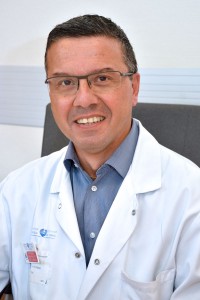A team of French doctors observed a “drastic and persistent decrease” of the HIV reservoir in a lung cancer patient given a drug commonly used to treat several cancers in their advanced stages.
 Dr. Jean-Philippe SpanoThe reservoir is the collection of HIV-infected cells that persists despite antiretroviral drugs and hides under the radar of the immune system. It is the wellspring of HIV that quickly rebounds when treatment is stopped.
Dr. Jean-Philippe SpanoThe reservoir is the collection of HIV-infected cells that persists despite antiretroviral drugs and hides under the radar of the immune system. It is the wellspring of HIV that quickly rebounds when treatment is stopped.
“This is the first case of such a drastic decrease of the HIV reservoir,” said Dr. Jean-Philippe Spano, head of the medical oncology department at Pitié-Salpêtrière Hospital in Paris where the patient was treated. But, he cautioned, “we must remain careful, especially because this is only one case.” Spano and his colleagues detailed the case last month in a letter published in Annals of Oncology.
The 51-year-old man was given nivolumab (marketed as Opdivo) once every two weeks starting in December 2016 after he relapsed following surgery and chemotherapy for his tumor. Nivolumab has been shown to be effective in treating melanoma, non-small cell lung cancer, and kidney cancer.
When the patient started treatment, his viral load was undetectable. It steadily climbed until day 45 before falling again. During that time, the activity of his T cells also increased. By day 120, he had experienced "a drastic and persistent decrease" in HIV reservoir levels, the researchers said.
Doctors believe the cancer drug may have enhanced the “killing” of HIV-infected cells by releasing the brakes the immune system deploys for safety. However, they noted that another HIV-infected patient given the same treatment did not experience a reduction in the reservoir.
Still, the findings “could have implications for HIV patients, both with and without cancer, as it can work on HIV reservoirs and tumor cells independently," Spano said. “The absence of side effects in this patient is also good news and suggests this could be an optimum treatment for HIV-infected patients with cancer."
Commenting on the study for HealthDay, Dr. Marcella Flores, amfAR’s associate director of research, called the case “interesting and hopeful.” However, she noted that while the drug caused a substantial decrease of the HIV reservoir, it did not completely eradicate the virus.
She told the news service that more work needs to be done to better understand this particular patient's experience and to figure out how it might help others.
See also:
https://www.healthline.com/health-news/lung-cancer-drug-point-to-cure-for-hiv#1
https://www.sciencedaily.com/releases/2017/11/171130214929.htm